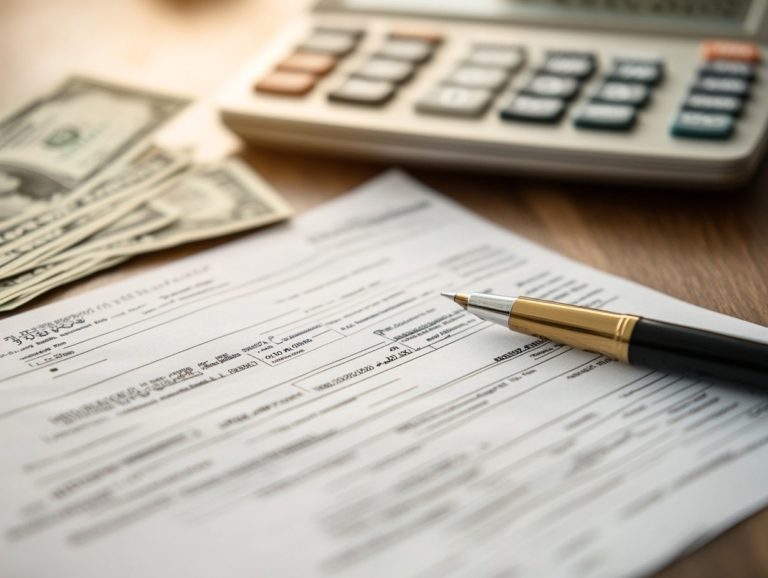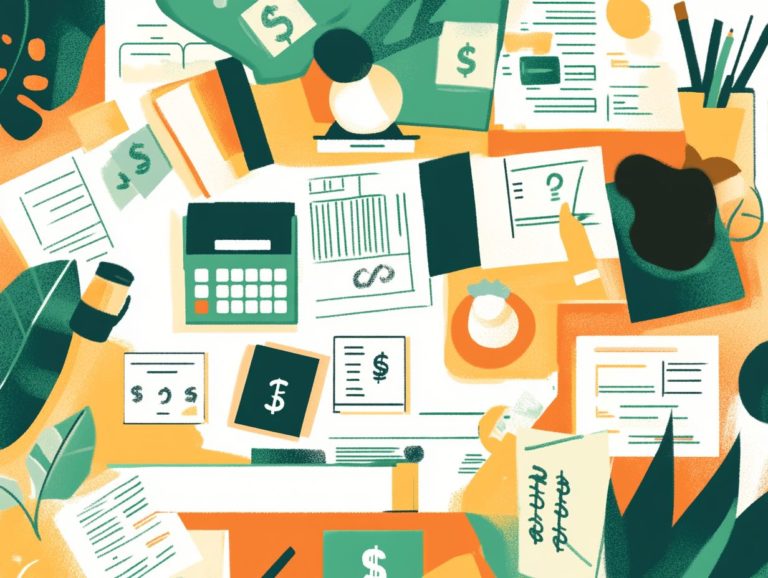Tax Planning Tips for New Freelancers
Navigating the world of taxes can feel overwhelming for freelancers, particularly when you’re balancing multiple clients and projects simultaneously.
Effective tax planning is not just a necessity; it’s a strategic approach to ensure compliance while maximizing your hard-earned income.
This article delves into essential tax deductions and offers best practices for organizing your finances. It also provides insights into the nuances of quarterly tax payments.
By the time you finish reading, you’ll be equipped with valuable tips to reduce your tax obligations and retain more of your hard-earned money.
Contents
- Key Takeaways:
- Understanding Tax Planning for Freelancers
- Key Tax Deductions for Freelancers
- Organizing Your Finances for Tax Season
- Quarterly Tax Payments for Freelancers
- Maximizing Tax Savings as a Freelancer
- Frequently Asked Questions
- What does tax planning mean for new freelancers?
- When should I start tax planning as a new freelancer?
- What are some common deductions for new freelancers?
- Should I set aside money for taxes as a new freelancer?
- How can I stay organized for tax planning as a new freelancer?
- Do I need to file quarterly taxes as a new freelancer?
Key Takeaways:

- Tax planning is crucial for freelancers to minimize tax obligations and avoid penalties.
- Key deductions for freelancers include business expenses, home office, and self-employment taxes.
- Organizing finances and making quarterly tax payments can help freelancers avoid last-minute stress during tax season and maximize their tax savings.
Understanding Tax Planning for Freelancers
Planning your taxes as a freelancer means carefully strategizing your financial decisions to minimize tax obligations while staying compliant with IRS regulations. This is especially crucial for self-employed people like you, who often face the complexities of fluctuating income throughout the year.
Grasping the intricacies of tax strategies not only aids in meeting filing deadlines but also gives you the power to take full advantage of the tax credits freelancers shouldn’t miss available to you. By meticulously organizing your financial records and maintaining a solid understanding of your business structure, you can pave the way for lasting financial stability and growth.
What is Tax Planning and Why is it Important for Freelancers?
Tax planning is an essential process for you as a freelancer. It involves a careful analysis of your financial situation to make informed decisions that optimize your tax obligations.
By actively engaging in this process, you can explore various tax strategies tailored specifically to your unique circumstances. This ultimately allows you to lower your tax obligations. For freelancers, avoiding common pitfalls is crucial; check out the top tax mistakes freelancers make and how to avoid them. Knowing your income projections is key. It guides your financial choices throughout the year.
Recognizing the importance of consulting a tax professional can be a game-changer. A tax professional can help you navigate the intricate landscape of tax laws and regulations. This will help you follow the rules and make the most of your deductions.
Embracing this proactive approach to tax management not only enhances your financial stability but also grants you the peace of mind to fully concentrate on your craft.
Key Tax Deductions for Freelancers
As a freelancer, you have the opportunity to leverage a range of tax deductions that can lower your taxable income significantly. This strategic approach enables you to manage your business expenses with greater efficiency and control.
Expenses that Can Be Deducted
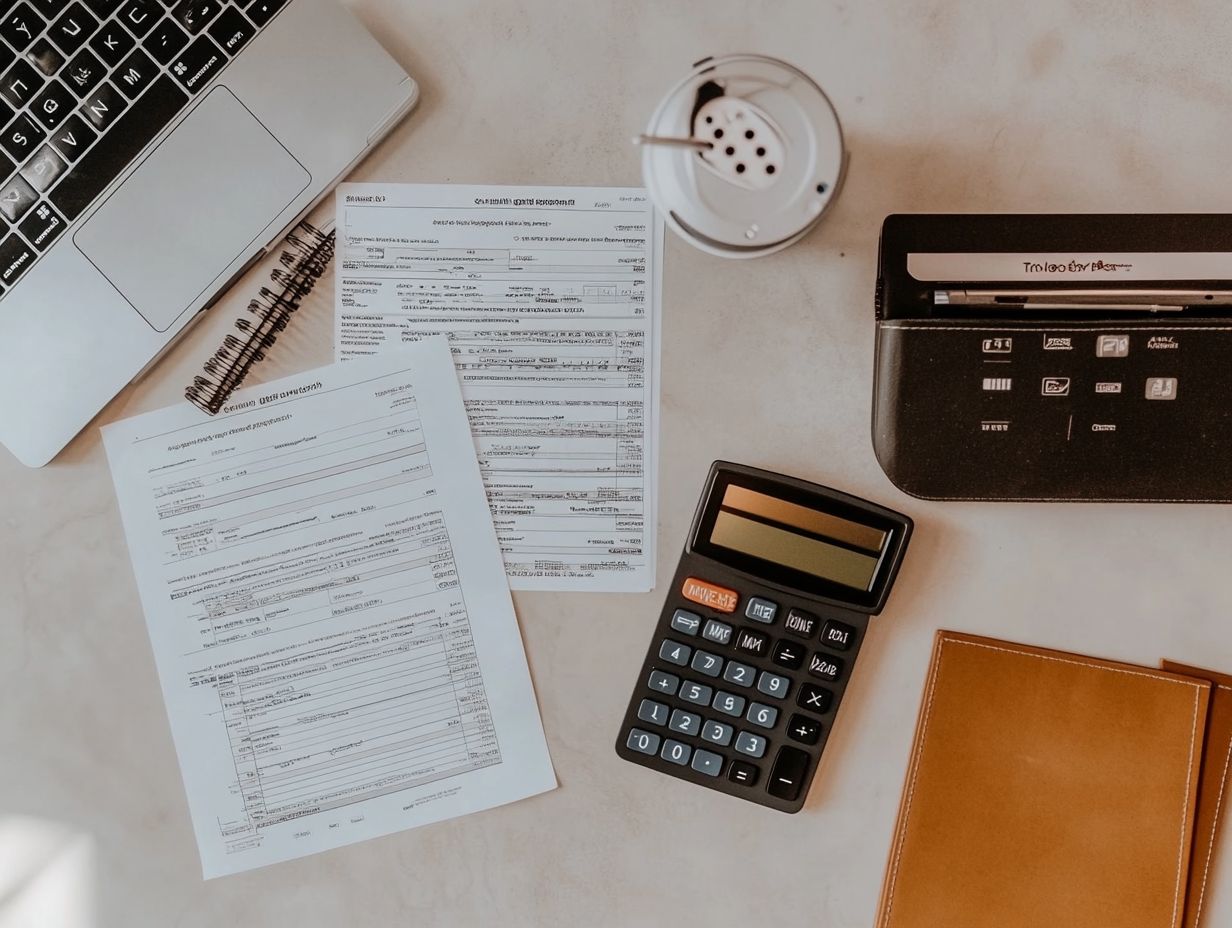
Freelancers like you can deduct a variety of business expenses, which encompass costs tied to marketing, home office setups, and other essential operational needs.
For instance, when you invest in advertising on social media platforms or purchase business cards, these expenses directly reduce your taxable income, reflecting the efforts you’ve made to attract clients. If you have a dedicated workspace at home, you can proportionally claim expenses related to utilities, internet, and even a portion of your rent. To further optimize your finances, consider following maximizing deductions: a freelancer’s guide, leading to significant savings when tax season rolls around.
You can also deduct software subscriptions for project management or accounting. However, it s crucial for you to meticulously document these transactions. Keeping organized records such as receipts, invoices, and payment confirmations will substantiate your deductions, ensuring compliance while maximizing your potential refunds.
Start organizing your finances today to enjoy peace of mind tomorrow.
Organizing Your Finances for Tax Season
Organizing your finances for tax season is essential for freelancers like you, as it ensures accurate reporting and compliance with the IRS’s tax obligations.
Taking the time to get your financial house in order not only streamlines the process but also helps you avoid potential pitfalls that could lead to unnecessary stress or penalties.
Best Practices for Record-Keeping
Implementing best practices for record-keeping is essential for freelancers, allowing you to efficiently manage your financial records and support your expense claims come tax season.
By systematically organizing your receipts, invoices, and financial statements, you ensure that every dollar spent is accounted for. Utilizing accounting software like QuickBooks or FreshBooks can further streamline this process, enabling you to automate calculations and generate reports with ease. Additionally, consider following 5 essential tax tips for creative freelancers to maximize your financial efficiency.
It’s crucial to keep your records up-to-date; accurate documentation enhances transparency and plays a significant role in maintaining tax compliance. Regularly review and categorize your expenses, set aside time each month to reconcile your accounts, and establish a secure digital filing system to manage your finances effectively. Understanding the importance of keeping tax records for freelancers will further support your financial organization.
Quarterly Tax Payments for Freelancers
For freelancers, making quarterly tax payments is essential to fulfilling self-employment taxes and ensuring financial stability year-round. Keeping up with these payments not only helps you stay compliant but also provides peace of mind as you navigate your financial landscape.
How to Calculate and Pay Quarterly Taxes
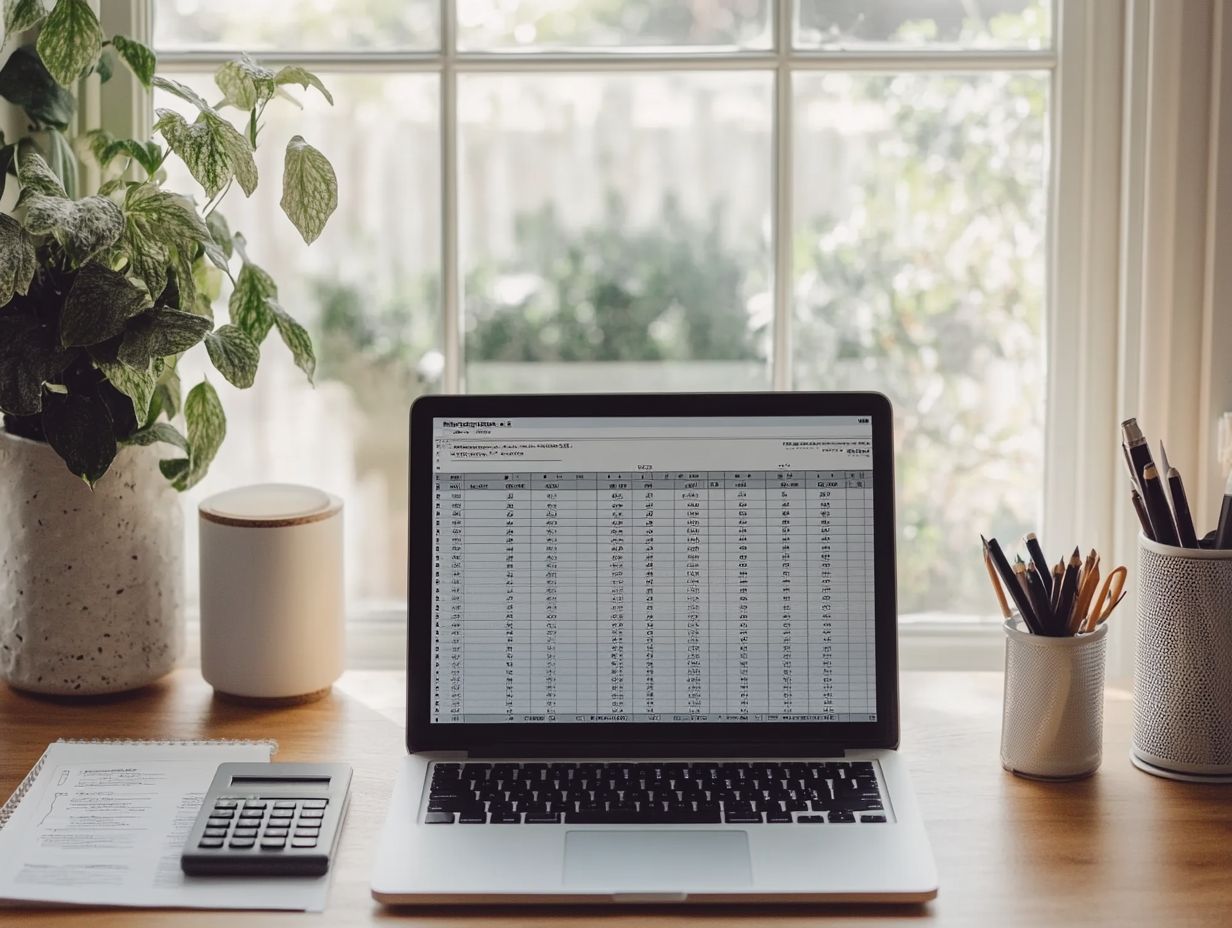
Calculating and paying your quarterly taxes requires a solid understanding of your estimated tax payments based on projected freelance income, all while aligning with IRS requirements.
Accurate financial records are essential in this process, as they enable you to easily evaluate your income and expenses throughout the year. Maintaining detailed records simplifies the calculation and minimizes the risk of errors that could lead to penalties.
Start by gathering all relevant financial documents, such as invoices, receipts, and bank statements. Once organized, you can estimate your tax obligations by calculating your net income (your total income minus your business expenses) and applying the appropriate tax rate. For detailed guidance, consider navigating quarterly taxes as a freelancer.
Choosing the right payment method is crucial, whether it’s opting for electronic funds transfer (a fast, secure way to send money online) or mailing a check. Don’t forget to mark your calendar for upcoming deadlines! By ensuring compliance with these regulations, you can focus your energy on what you do best creating and providing exceptional services. Additionally, consider exploring freelancer tax strategies for increased savings to optimize your finances.
Maximizing Tax Savings as a Freelancer
Maximizing tax savings is essential for freelancers like you. By employing effective strategies, you can significantly reduce your tax liabilities, allowing you to invest in retirement plans and health savings accounts.
This approach boosts your financial stability and empowers you to secure your future. Take charge of your finances today!
Tips for Reducing Tax Liability
Reducing your tax liability hinges on understanding your eligible tax deductions and effectively managing your business expenses throughout the year.
By meticulously tracking every financial transaction—yes, that includes all those receipts and invoices—you can gain a clearer picture of your deductible expenses. Leveraging accounting software or apps can streamline this process, making it effortless to categorize your expenditures related to home office setups, travel, and equipment purchases. Additionally, knowing how to choose the right tax software as a freelancer can further enhance your financial management.
It’s also wise to familiarize yourself with standard deductions that apply to your profession, such as those for healthcare and retirement contributions. By staying organized and proactive, you can navigate your tax obligations with greater ease, enhancing your financial health and peace of mind.
Frequently Asked Questions
What does tax planning mean for new freelancers?
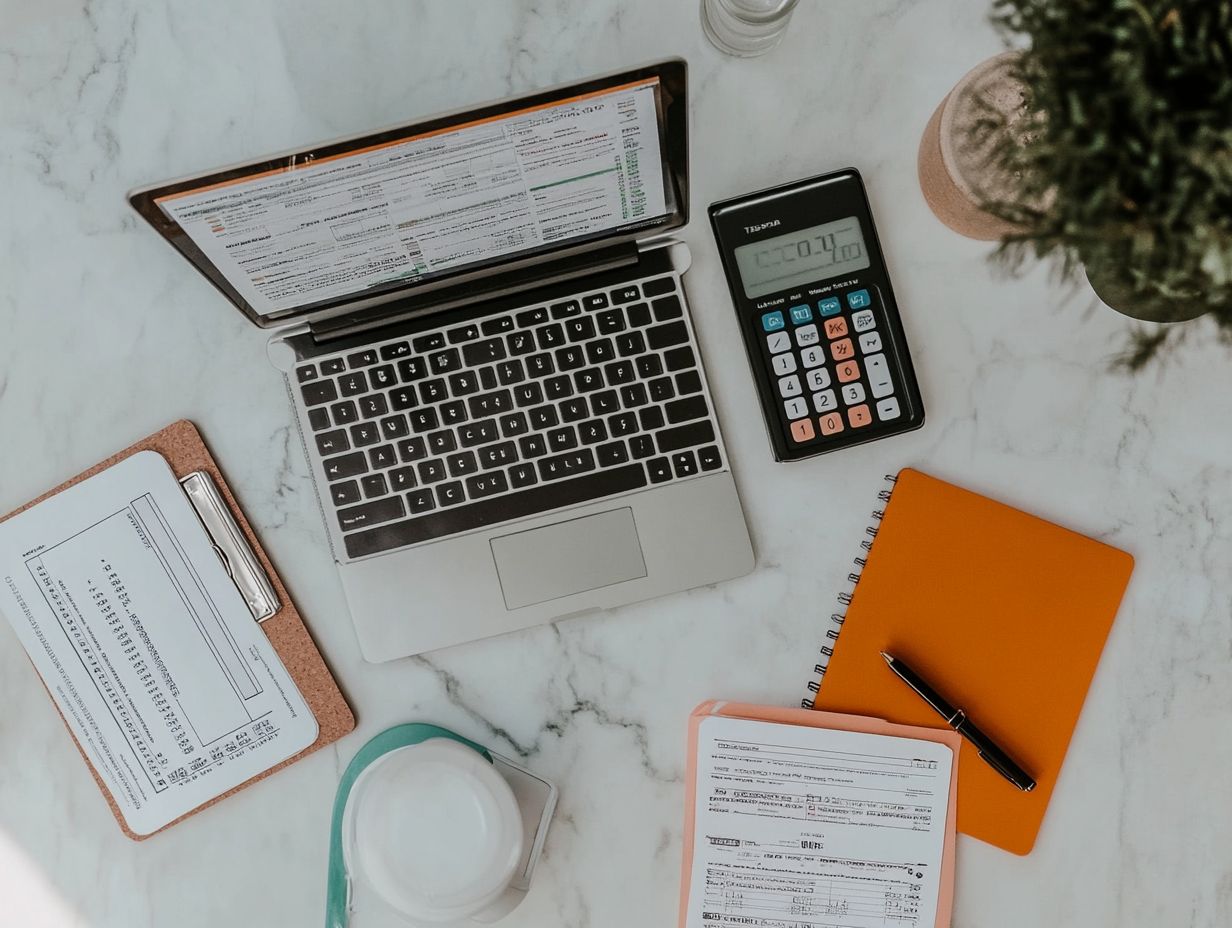
Tax planning for new freelancers means organizing your finances smartly. This helps you minimize what you owe in taxes by understanding your financial responsibilities and keeping good records.
When should I start tax planning as a new freelancer?
Start tax planning as soon as you earn income. This ensures you’re organized and helps you avoid any last-minute tax surprises.
What are some common deductions for new freelancers?
You can claim deductions like home office costs, business supplies, and travel expenses. Ask a tax professional for guidance to make sure you’re getting all the deductions available to you.
Should I set aside money for taxes as a new freelancer?
Absolutely! Set aside part of your income now to avoid surprises later. This will help you dodge a hefty bill when tax season arrives.
How can I stay organized for tax planning as a new freelancer?
Keep accurate records of all your income and expenses. Using accounting software or hiring a bookkeeper can make this much easier.
Do I need to file quarterly taxes as a new freelancer?
If you expect to owe over $1,000 in taxes for the year, you need to file quarterly estimated taxes. Staying on top of these payments helps you avoid penalties and interest fees.

